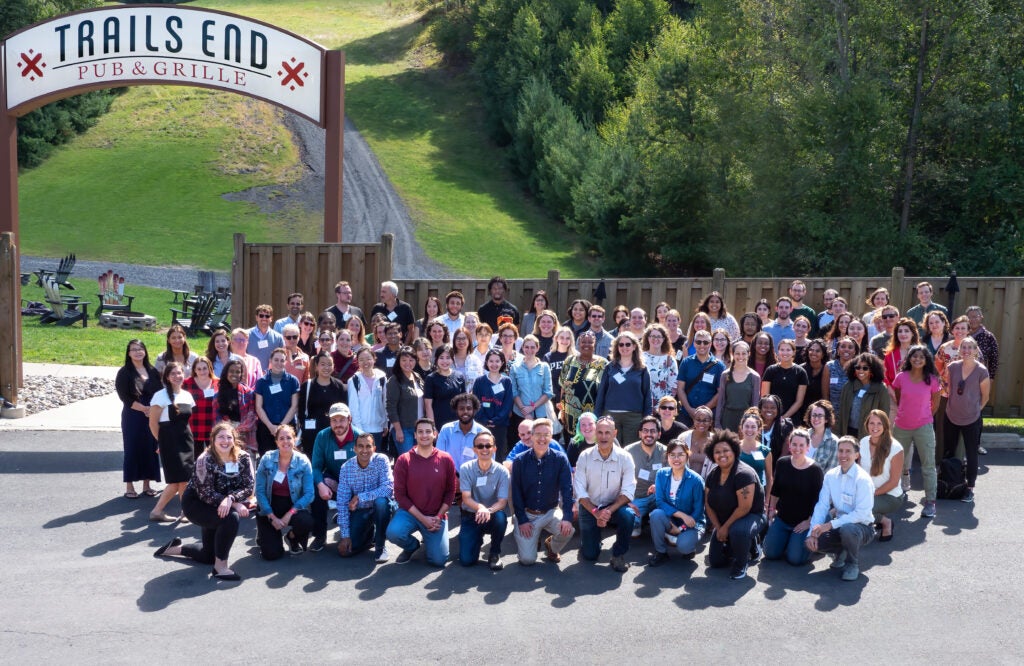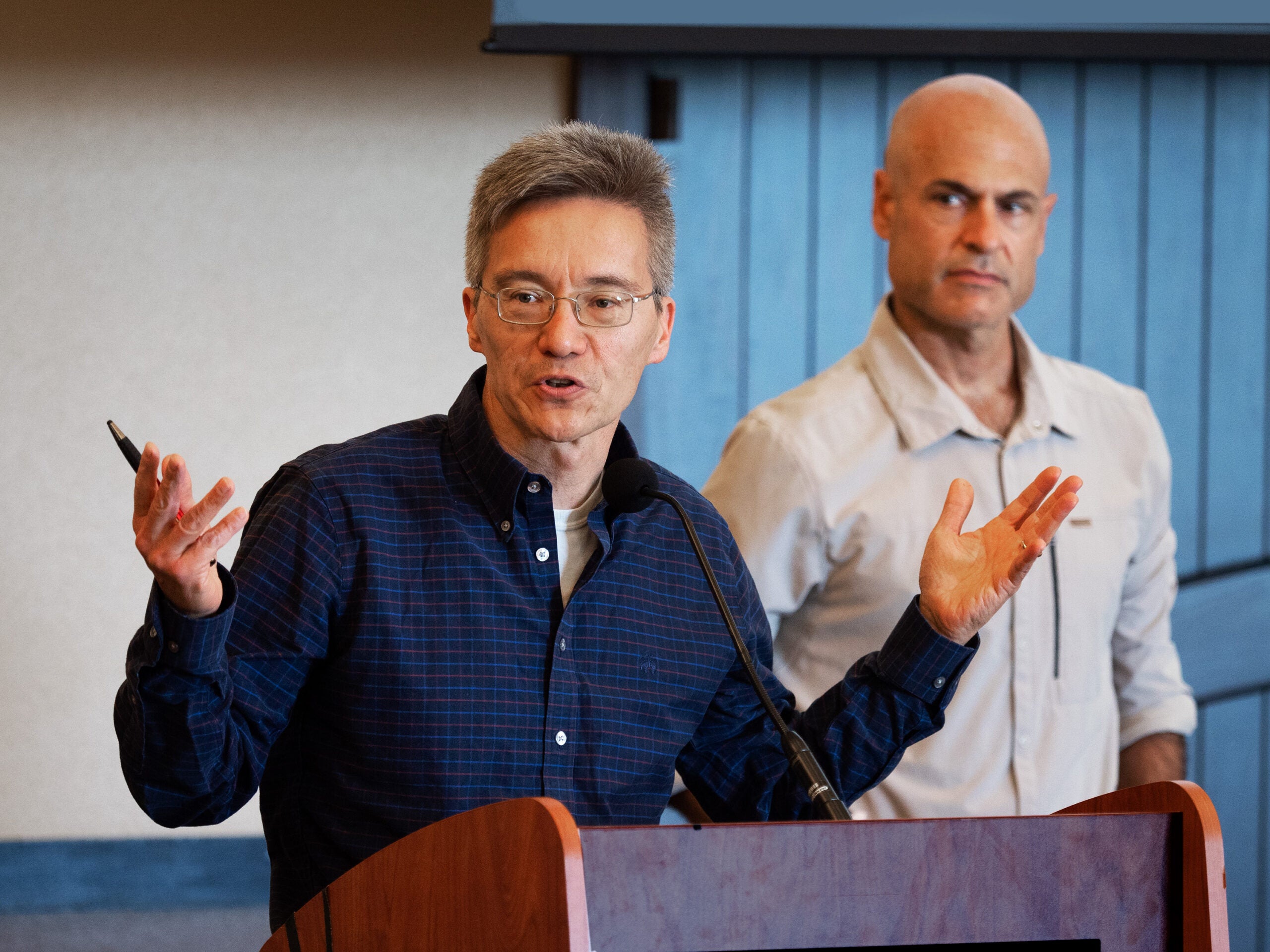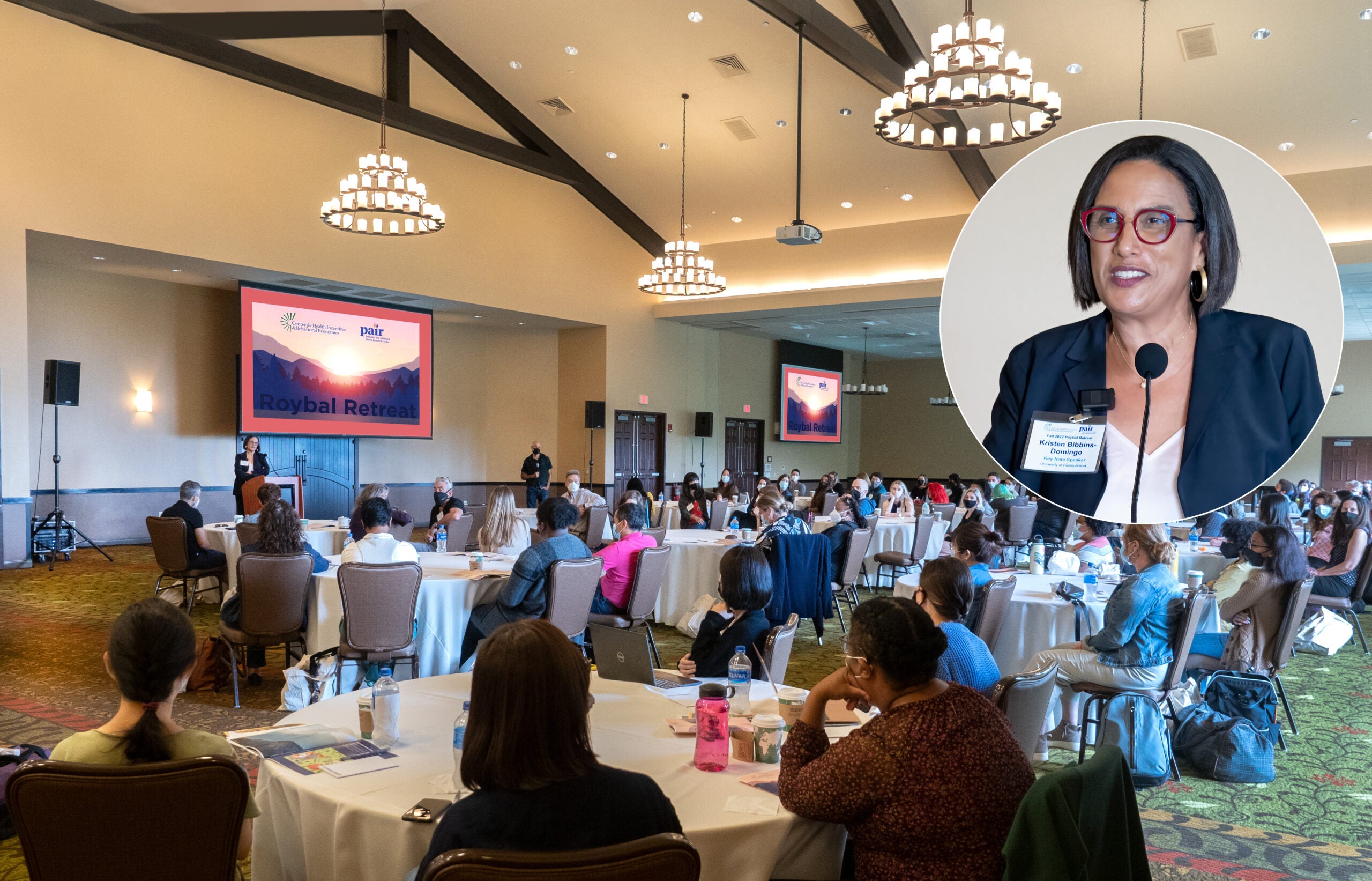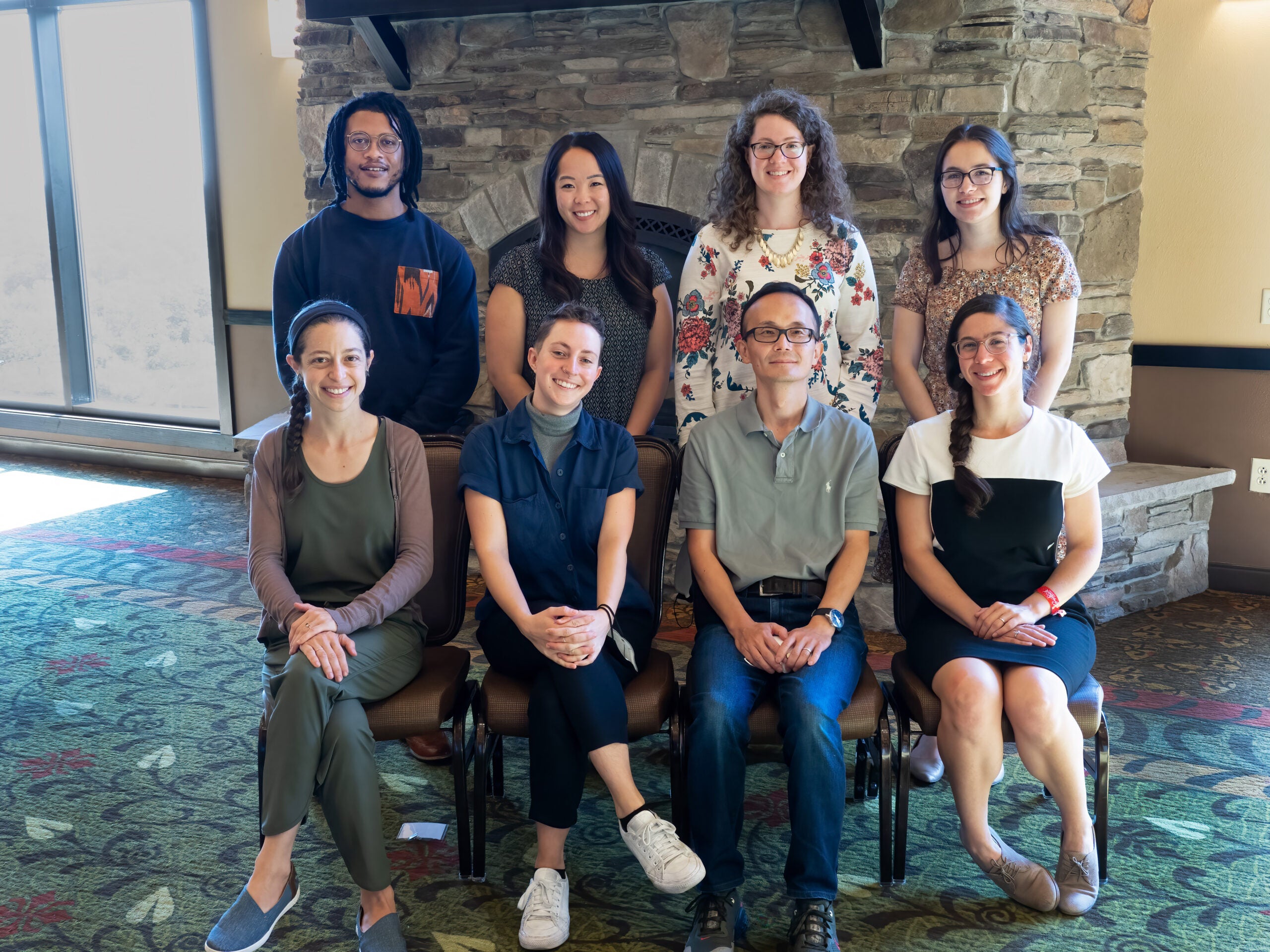CHIBE and PAIR Host 2022 Roybal Retreat in the Poconos

At this year’s Roybal Retreat, 115 attendees examined a mountain of new evidence from their fellow CHIBE and PAIR colleagues, and a few early-risers even ascended Mount Pocono during our two-day conference.
The Roybal Retreat, held this year at Camelback Resort, is a chance for the two centers to share their research and build and strengthen relationships across disciplines and institutions. The theme for this year’s retreat was Upward Bound – a reflection of our collective ascent to new heights in research and the setting in the mountains.
PAIR Director Scott Halpern, MD, PhD, opened up the retreat with news from the PAIR Center, including an update on the Healthy Lungs initiative, which is comparing smoking cessation interventions among underserved patients referred for lung cancer screening—as well as the BETTER Center, which seeks to use behavioral economics to transform trial enrollment representativeness. He also highlighted Chris Chesley, MD, MSCE, and his exploration of mechanisms of racial disparities in acute care delivery, and Rachel Kohn, MD, MSCE, whose revelation that persons of color with lung diseases are less commonly admitted to specialty pulmonary services is changing admission processes at Penn.

CHIBE Director Kevin Volpp, MD, PhD, shared updates from CHIBE, including that two of our affiliated faculty won a $10 million grant to conduct a randomized controlled trial of concentrated investment in Black neighborhoods in Philadelphia. Also, one of our associate directors Jalpa Doshi, PhD, and her team conducted research that led to Medicare Part D prescription drug benefit design change in the Inflation Reduction Act. And, a team led by M. Kit Delgado, MD, PhD, found that patients who used a program called COVID Watch were 68% less likely to die than those not using it. This research received publication-of-the-year awards from both AcademyHealth and Annals of Internal Medicine.
“I want to give a shout-out to our faculty who continue to get lots of awards, and we’re proud of each of them for what they’ve been able to do, but a lot of this work is really done in teams by all of you and they’re really team awards… I want to thank all of you for the work you do supporting the important, impactful work that our teams are putting forward,” Dr. Volpp said.
Keynote

CHIBE and PAIR were also thrilled to have Kirsten Bibbins-Domingo, PhD, MD, MAS, Editor-in-Chief of the Journal of the American Medical Association (JAMA) and the JAMA Network, and the Lee Goldman, MD Endowed Professor of Medicine and Professor of Epidemiology and Biostatistics at the University of California, San Francisco, as our keynote speaker this year. Dr. Bibbins-Domingo spoke about improving representation in clinical trials and research and building research equity for women and underrepresented groups. She chaired a committee with the National Academies of Sciences, Engineering, and Medicine on this topic and shared some of their findings (see their report here).
Dr. Bibbins-Domingo spoke about why diverse representation in clinical research matters, including that a lack of it may:
- Compromise the generalizability of clinical research findings to the US population
- Cost hundreds of billions of dollars
- Hinder innovation
- Compound low accrual that causes many trials to fail
- Lead to lack of access to effective medical interventions
- Undermine trust
- Compound health disparities in the populations currently underrepresented in clinical trials and clinical research
Some of the facilitators of successful inclusion in research she noted were establishing trust with participants and the community at large, anticipating and removing barriers for people to participate in the study, maintaining flexibility in recruitment and data collection, and optimizing the study team to ensure alignment with research goals. Improving representation is urgent, and it requires investment, transparency, accountability, and a paradigm shift, Dr. Bibbins-Domingo noted.
In answer to a question about her career, Dr. Bibbins-Domingo shared a piece of advice she received from a mentor that made a big impact on her as she entered academia.
“The most important influences on me have been mentors who told me to back off and not count publications but to think about publications that really move the field forward,” she said. “I had a mentor who told me, ‘Careers are moved by a few publications that really change how people think about something, and then all of the rest is about wonderful collaborations and things that you do along the way…’. Framing it that way made an impact on me that I was going to look for not just publishing the next paper but doing the thing that would change people’s ways of thinking about a particular issue. And those have been the most rewarding papers for me, and it’s been the most rewarding to be part of teams that do that.”
Watch Dr. Bibbins-Domingo’s keynote presentation here.
Joint Research Practices (JRP)

The Joint Research Practices (JRP) group, a joint initiative between CHIBE and PAIR, also facilitated a workshop for Roybal attendees. JRP’s mission is to “develop and disseminate evidence-based best practices and guidelines for the conduct of inclusive and anti-racist research that advances the science and practice of health equity.” The group discussed Penn Professor Albert Kligman’s unethical and racist Holmesburg Prison experiments and then led small group discussions on topics related to 1) community engagement; 2) payment and incentives; 3) measurement, treatment, reporting and dissemination; and 4) recruitment, retention, eligibility, and representativeness.
Research Presentations
The retreat also featured 12 research presentations on the following topics:
- Using curiosity to counter health information avoidance
- Findings from the U-REAACT trial to improve adherence across two pediatric chronic disease populations: kidney transplant and Spina Bifida
- Sleep, habit formation, and educational impact
- Effects of a workplace mandate for COVID-19 vaccination at long-term care facilities
- Characterizing equity of intensive care unit admissions for sepsis and acute respiratory failure
- Operationalizing the social determinants of critical care
- Clinical presentation characteristics associated with antimicrobial timing among patients with hospital-acquired sepsis
- Generalizing personalized treatment assignment rules for vaccine uptake in multi-arm trials
- Caregiving youth: A hidden cause of inequity
- Cognitive endurance as human capital
- Learning from Indlela: An HIV-focused “nudge unit” seeking to build capacity to design and test behavioral solutions to improve health in South Africa
- Investigating MEAsures of SUrvival and REsidence among persons with Dementia (I-MEASURED)
CHIBE and PAIR would like to thank Hoag Levins, Editor of Digital Publications at the Leonard Davis Institute, for photographing the event and videotaping the keynote. See a gallery of photos from retreat here.
About the Penn Roybal Center
In 2009, CHIBE investigators successfully competed for NIH funding to establish what was then one of two NIH Centers on behavioral economics and health (now the Penn Roybal Center on Behavioral Economics and Health). This program is now one of 13 Roybal Centers nationally supported by the National Institute on Aging to conduct translational research in middle-aged and older populations. A multidisciplinary team of researchers from the University of Pennsylvania, Carnegie Mellon University, and other universities comprises our Roybal Center. Scientists from the fields of medicine, economics, psychology, statistics, law, epidemiology, and other disciplines work together to design interventions that leverage principles of behavioral economics to improve health and health care by increasing healthy behavior, improving chronic disease management, and increasing the quality and value of clinician care.
About the Penn Roybal Center on Palliative Care in Dementia
Created in 2019 with support from a five-year grant from the National Institute on Aging to conduct translational research on aging populations, the Penn Roybal Center on Palliative Care in Dementia is one of 13 Roybal Centers in the nation. It is one of four such Centers studying dementia, and the only Center focused on palliative care for people living with dementia and their caregivers. The Center is housed within Penn’s Palliative and Advanced Illness Research (PAIR) Center. It brings together behavioral and data scientists from the Penn Schools of Medicine, Nursing, Arts and Sciences, Wharton, and Engineering, and dementia experts from across the United States, to develop and test novel interventions that bridge the dramatic gap between the supply of, and the need for, palliative care services among persons with dementia receiving long-term care and their family caregivers.